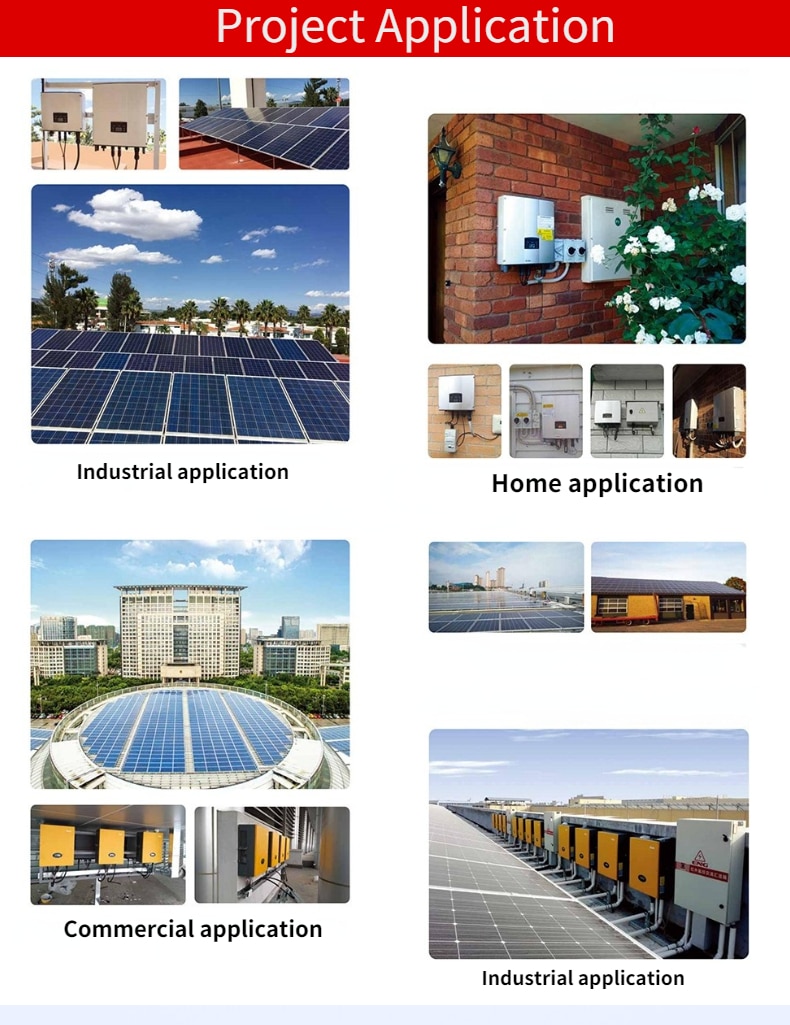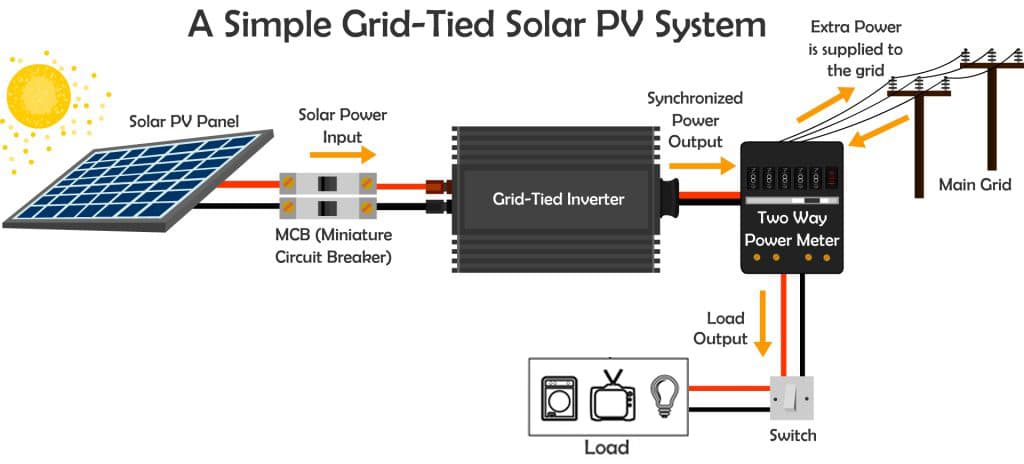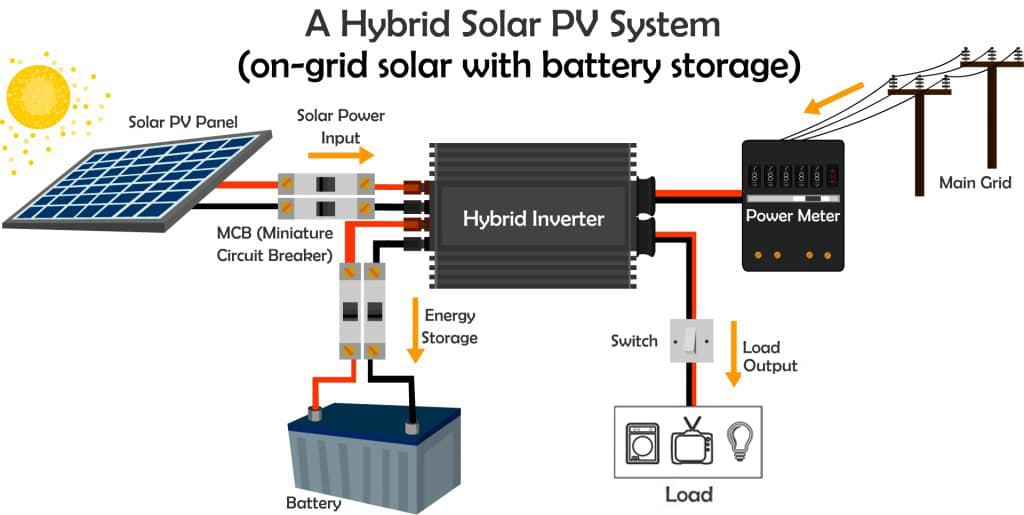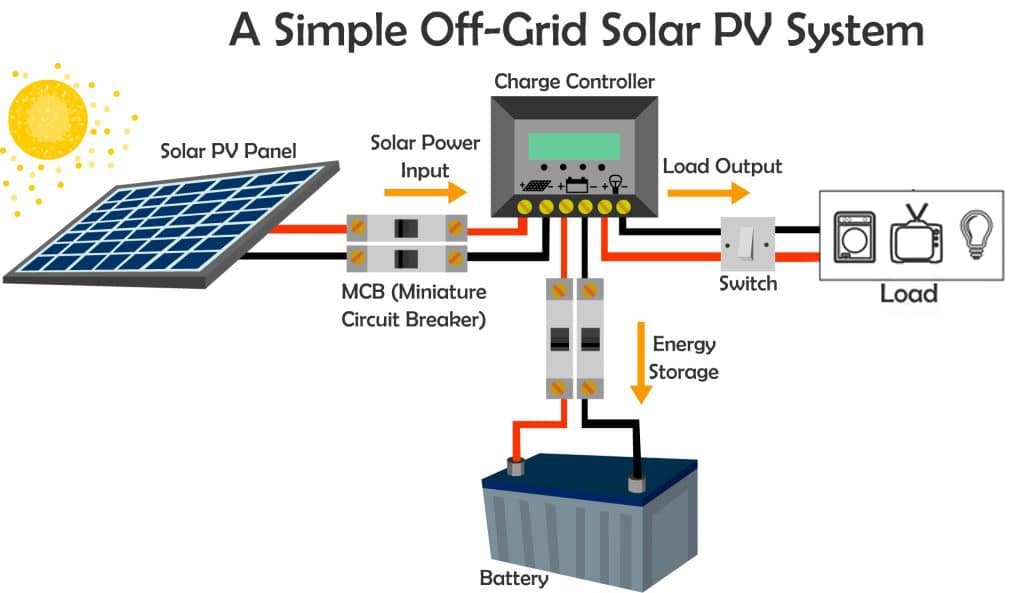
Are you curious about how home solar battery storage works? In this article, we will dive into the fascinating world of home solar batteries and shed light on their functionality and benefits.
Home solar battery storage has become increasingly popular as more people are looking for sustainable and reliable energy solutions. By harnessing the power of the sun, these batteries allow you to store excess energy generated by your solar panels, ensuring that you have a backup power source when you need it.
So, how exactly does it work? Well, home solar battery storage systems are made up of several components that work together seamlessly. From the solar panels that capture sunlight and convert it into electricity to the inverter that converts the DC power into AC power for use in your home, each component plays a crucial role in the system’s functionality.
Additionally, the battery itself stores the excess energy produced by your solar panels, allowing you to use it during times when your panels aren’t generating enough power, such as at night or on cloudy days. With home solar battery storage, you can have peace of mind knowing that you have a reliable and sustainable energy solution right at your fingertips.
Introduction to Home Solar Battery Storage
At Smartrade, we understand that our typical client values reliable and high-quality home solar batteries that meet their energy needs while also being affordable. So, let’s dive into the introduction of how home solar battery storage works and shed some light on this innovative technology.
Home solar battery storage is a revolutionary solution that allows homeowners to store excess energy generated by their solar panels for later use. Traditional solar power systems are directly connected to the grid, which means that any excess energy produced during the day is sent back to the grid and wasted. With home solar battery storage, this excess energy can be stored in a battery for use during periods of low solar production, such as at night or on cloudy days.
The heart of a home solar battery storage system is the battery itself. These batteries are specially designed to store large amounts of energy and release it when needed. They are typically made up of multiple battery cells, which are connected together to form a battery pack. The battery pack is then connected to the home’s electrical system, allowing the stored energy to be used to power appliances, lights, and other electrical devices.
When the sun is shining and the solar panels are producing more energy than the home needs, the excess energy is directed to the battery pack for storage. The battery pack charges up, storing the energy for later use. When the sun goes down or the solar panels are not producing enough energy, the battery pack kicks in and releases the stored energy to power the home. This ensures a continuous supply of power, even when the sun is not shining.
Home solar battery storage offers many benefits to homeowners. First and foremost, it allows them to become more self-sufficient and less reliant on the grid. By storing excess energy, homeowners can reduce their reliance on the grid during peak times, which can help lower electricity bills. Additionally, home solar battery storage provides a backup power source during blackouts or other grid failures, ensuring that essential appliances and devices can still be powered.
Home solar battery storage is a game-changer in the world of renewable energy. It allows homeowners to maximize the use of solar power by storing excess energy for later use. With Smartrade’s reliable and high-quality home solar batteries, our typical client can enjoy the benefits of this innovative technology, including lower electricity bills and increased energy independence. We’re committed to providing affordable and efficient solutions that meet the power needs of our clients while exceeding their expectations.

Understanding the Components of a Home Solar Battery System
Imagine having a reliable and efficient system that powers your home using the abundant energy of the sun. With a home solar battery storage system, this can become a reality.
In this article, we will delve into the components that make up a home solar battery system and how they work together to provide you with clean and sustainable energy.
The heart of a home solar battery system is the battery itself. This is where the excess energy generated by your solar panels is stored for later use. The battery is typically made up of multiple individual cells, which are connected to form a larger battery pack. These cells store energy in the form of chemical reactions, allowing you to tap into the stored power when the sun isn’t shining.
To charge the battery, you need a solar inverter. This device converts the DC (direct current) electricity produced by your solar panels into AC (alternating current) electricity, which is what your home appliances use. The solar inverter also manages the flow of electricity between your solar panels, battery, and the electrical grid. It ensures that energy is efficiently transferred to the battery when it’s being charged and back to your home when it’s being used.
Another crucial component of a home solar battery system is the charge controller. This device regulates the charge going into the battery to prevent overcharging or damage. It monitors the battery’s state of charge and adjusts the charging current accordingly. A good charge controller ensures that your battery is charged optimally and extends its lifespan.
To monitor and control your home solar battery system, you need a battery management system (BMS). This system is responsible for monitoring the battery’s performance, temperature, and voltage levels. It also ensures the safety and protection of the battery by preventing overcharging, overheating, and over-discharging. The BMS provides real-time data and alerts, allowing you to keep track of your energy usage and the health of your battery.
In conclusion, a home solar battery system consists of several key components that work together to provide you with reliable and sustainable energy. The battery stores excess energy generated by your solar panels, the solar inverter converts this energy into a usable form, the charge controller regulates the charging process, and the battery management system monitors and protects the battery. With a well-designed and properly installed home solar battery system, you can harness the power of the sun and enjoy clean energy while reducing your carbon footprint.

Charging and Storing Energy: How Home Solar Batteries Work
When considering the charging and storage of energy, you may wonder how home solar batteries operate and efficiently harness the power of the sun.
Home solar batteries are a crucial component of a solar energy system, allowing you to store the excess electricity generated by your solar panels during the day for use at night or during periods of low sunlight.
The process begins with the solar panels mounted on your roof or property. These panels are made up of photovoltaic cells that convert sunlight into direct current (DC) electricity.
The DC electricity flows from the solar panels to an inverter, which converts it into alternating current (AC) electricity that can be used to power your home.
Once the electricity is converted into AC, it is either used directly in your home or sent to the home solar battery for storage. The home solar battery acts as a reservoir, storing the excess electricity that is generated but not immediately used.
This stored energy can then be accessed when the demand for electricity exceeds the supply from the solar panels, such as during the evening or on cloudy days.
To charge the home solar battery, the AC electricity from the solar panels or the grid is converted back into DC through the inverter. The DC electricity is then sent to the battery for storage.
The battery uses a chemical reaction to store the electricity, typically using lithium-ion technology. This allows the battery to store large amounts of energy in a compact and efficient manner.
When you need electricity, such as during the night or when there is low solar generation, the home solar battery releases the stored energy back into the inverter, which converts it back into AC electricity for use in your home.
This continuous cycle of charging and discharging ensures that you have a reliable and consistent energy supply, even when the sun is not shining or during power outages.
Home solar batteries play a vital role in the charging and storage of energy in a solar energy system. They allow you to store excess electricity generated by your solar panels for use at a later time, ensuring a consistent and reliable energy supply.
By harnessing the power of the sun and efficiently storing energy, home solar batteries provide homeowners with greater energy independence and the ability to reduce their reliance on the grid.



Benefits of Home Solar Battery Storage
One of the key advantages of utilizing home solar batteries is the increased energy independence and reduced reliance on the grid. By installing a home solar battery storage system, you can store the excess energy generated by your solar panels during the day and use it when the sun is not shining or during peak demand periods. This means that even when the grid goes down or during power outages, you can still have access to electricity and power your essential appliances.
This level of energy independence gives you peace of mind and ensures that you’re not solely dependent on the grid for your electricity needs.
Another significant benefit of home solar battery storage is the potential for cost savings. With a solar battery system, you can maximize the utilization of your solar panels by storing excess energy and using it during times when electricity rates are higher. This allows you to offset the need to purchase electricity from the grid during peak demand periods when electricity prices are typically at their highest. By reducing your reliance on grid electricity, you can lower your overall energy costs and potentially save money on your monthly utility bills.
Home solar battery storage also provides environmental benefits. By storing excess energy and using it when needed, you reduce the need for traditional fossil fuel-based power generation. This means that less carbon dioxide and other greenhouse gases are emitted into the atmosphere, helping to mitigate climate change.
By investing in a home solar battery system, you’re actively contributing to a cleaner and more sustainable energy future.
Lastly, home solar battery storage systems offer a reliable and consistent power supply. Traditional grid electricity can be subject to fluctuations and power outages, especially during extreme weather events or times of high demand. With a solar battery system, you have a backup power source that can provide electricity even when the grid is down. This is particularly valuable for those living in areas prone to blackouts or for individuals who require an uninterrupted power supply for medical equipment or other critical needs.
The benefits of home solar battery storage systems are numerous. From increased energy independence and cost savings to environmental sustainability and reliable power supply, these systems offer a range of advantages for homeowners. By harnessing the power of the sun and storing excess energy, you can reduce your reliance on the grid, lower your energy costs, protect the environment, and ensure a consistent supply of electricity.
Investing in a home solar battery system isn’t just financially beneficial but also a step towards a greener and more sustainable future.
Factors to Consider When Choosing a Home Solar Battery System
Selecting the right home solar battery system can be a game-changer, empowering you to take control of your energy consumption and make a positive impact on both your wallet and the environment. When choosing a home solar battery system, there are several factors you should consider to ensure that it meets your specific requirements and provides optimal performance.
The first factor to consider is the capacity of the battery system. This refers to the amount of energy the battery can store and deliver. It’s essential to assess your energy needs and determine the capacity that will be sufficient to meet your daily requirements. Consider factors such as the size of your home, the number of appliances you use, and your average energy consumption.
Opting for a battery system with a higher capacity ensures that you have enough stored energy to power your home during periods of low sunlight or power outages.
Another critical factor to consider is the battery’s efficiency. The efficiency of a home solar battery system determines how effectively it can convert and store energy from the sun. A more efficient system will allow you to maximize your energy usage and reduce wastage.
Look for batteries with high round-trip efficiency, which means they can store and release energy with minimal losses. This ensures that you get the most out of your solar energy system and save on electricity costs in the long run.
The lifespan of the battery is also an important consideration. Home solar battery systems are a significant investment, and you want to ensure that you get the most out of your purchase. Look for batteries that have a long lifespan, typically measured in cycles. The more cycles a battery can withstand, the longer it will last.
Additionally, consider the warranty offered by the manufacturer. A solid warranty provides you with peace of mind and ensures that you are protected in case of any issues with the battery system.
Lastly, it is crucial to consider the compatibility and integration of the home solar battery system with your existing solar panels and inverters. Ensure that the battery system you choose is compatible with your current setup to avoid any compatibility issues.
Additionally, consider the ease of integration and installation. Opt for a system that is easy to install and can seamlessly integrate with your existing solar power system.
By considering these factors when choosing a home solar battery system, you can make an informed decision that aligns with your energy needs and goals. Remember, investing in a high-quality battery system won’t only help you save on electricity costs but also contribute to a more sustainable future.
Selecting the right battery system is a crucial step towards harnessing the power of solar energy and enjoying the benefits of renewable energy in your home.
Frequently Asked Questions
Can I still use my home solar battery storage system during a power outage?
Yes, you can still use your home solar battery storage system during a power outage. When the power goes out, your solar battery system will automatically switch to backup mode, providing you with the electricity you need to power your home.
The solar panels on your roof will continue to generate electricity during the day, which will be stored in the battery for use at night or during an outage. This allows you to have a reliable source of power even when the grid is down.
With a home solar battery storage system, you can enjoy the benefits of renewable energy while ensuring that you have electricity when you need it the most.
What maintenance is required for a home solar battery storage system?
Maintaining a home solar battery storage system is essential for ensuring its optimal performance and longevity. Regular maintenance helps to prolong the lifespan of the batteries and ensures that they continue to function efficiently.
There are a few key maintenance tasks that you should consider. Firstly, it’s important to regularly check the battery’s charge level and recharge it if necessary. This can be done by monitoring the battery’s state of charge using the system’s monitoring software.
Additionally, it’s recommended to inspect the battery for any signs of damage or wear, such as corrosion or leaks, and address them promptly. Cleaning the battery terminals and connections to prevent any buildup of dirt or debris is also crucial.
Furthermore, keeping the battery in an environment with suitable temperature conditions can contribute to its longevity. Lastly, it’s advisable to follow the manufacturer’s guidelines for maintenance and consult a professional if you encounter any issues or concerns.
By adhering to these maintenance practices, you can ensure that your home solar battery storage system operates efficiently and reliably, providing you with the energy storage you need, even during power outages.
Can I connect multiple home solar battery storage systems together for increased storage capacity?
Yes, you can connect multiple home solar battery storage systems together to increase storage capacity. By connecting multiple systems in parallel, you can combine the storage capacity of each individual battery, allowing you to store more energy from your solar panels.
This means that you’ll have a larger reserve of energy available for use during times when your solar panels aren’t producing enough electricity, such as at night or during cloudy days.
Connecting multiple systems also provides redundancy, ensuring that even if one battery fails, the others will continue to function, providing uninterrupted power supply.
Overall, connecting multiple home solar battery storage systems is a great way to increase your storage capacity and enhance the reliability of your solar energy system.
How long do home solar battery storage systems typically last?
Home solar battery storage systems typically last for a long time, providing you with reliable backup power and significant savings on your energy bills. On average, these systems can last anywhere from 5 to 15 years, depending on various factors such as the quality of the batteries, maintenance, and usage patterns.
However, it’s important to note that with advancements in technology and improvements in battery design, the lifespan of these systems is continuously increasing. By investing in a high-quality home solar battery storage system from Smartrade, you can be confident in enjoying its benefits for many years to come.
Are home solar battery storage systems eligible for government incentives or tax credits?
Yes, home solar battery storage systems are indeed eligible for government incentives and tax credits.
Many governments around the world recognize the importance of renewable energy and offer various incentives to encourage homeowners to install solar battery systems. These incentives can include tax credits, rebates, grants, and even low-interest loans.
By installing a home solar battery storage system, you not only reduce your reliance on the grid and save on electricity bills but also have the opportunity to take advantage of these incentives, which can significantly offset the upfront costs of the system.
It’s important to check with your local government or consult a solar energy professional to understand the specific incentives available in your area. Taking advantage of these incentives can not only make your investment in a home solar battery storage system more affordable but also contribute to a cleaner and more sustainable future.
Conclusion
In conclusion, home solar battery storage is a game-changer when it comes to harnessing and utilizing renewable energy. By capturing and storing excess energy generated by your solar panels, these batteries allow you to have a reliable and sustainable power source even during times of low sunlight or power outages.
With the ability to seamlessly switch between grid power and stored energy, you have the flexibility to optimize your energy usage and reduce reliance on the grid.
Not only do home solar batteries offer energy independence, but they also provide significant cost savings. By using stored energy during peak demand periods when electricity rates are higher, you can reduce your utility bills. Additionally, with the option of selling excess stored energy back to the grid, you can potentially earn credits or even generate income.
When considering a home solar battery system, it is important to evaluate factors such as the capacity of the battery, its lifespan, and compatibility with your existing solar panels. It is also crucial to choose a reputable manufacturer like Smartrade, who offers reliable and durable solutions that meet your energy needs.
By investing in home solar battery storage, you can take a significant step towards a greener and more sustainable future. With the ability to store and utilize renewable energy at your fingertips, you can contribute to reducing carbon emissions and promoting a cleaner environment. So why wait? Make the switch to home solar battery storage and enjoy the benefits of reliable, cost-effective, and eco-friendly energy.
